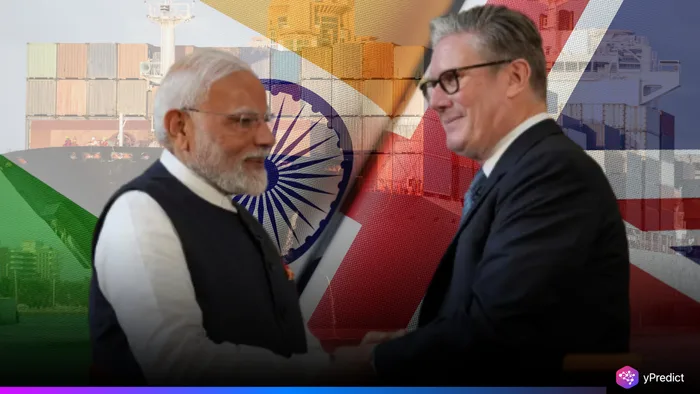
The UK and India have signed a historic free trade agreement that will reshape their economic partnership. This deal aims to boost trade between the two nations by up to £25.5 billion annually in the long run. It builds on more than 170 years of shared history and strong bilateral cooperation.
Ministers and business leaders gathered in London to celebrate this pivotal moment. The agreement followed a high-level conversation between UK Prime Minister Keir Starmer and Indian Prime Minister Narendra Modi. Bill Winters, Group Chief Executive and co-chair of the UK-India Financial Partnership, also played a key role in the discussions.
Strengthening a Long-Standing Partnership
This historic UK-India free trade agreement is the result of deep-rooted economic ties between the two countries. With its headquarters in the UK and a legacy of over 170 years in India, the signing organisation symbolises the trust and value built over time.
This deal is not just a diplomatic gesture — it is an economic catalyst. The agreement is expected to unlock new markets, enhance service sector cooperation, and boost bilateral trade growth. The economies of both nations stand to gain from reduced tariffs, improved market access, and increased investment flows.
Leaders Back Ambitious Economic Vision
The event that took place today showcased the commitment of political will on both sides. UK Business and Trade Secretary Jonathan Reynolds and India’s Commerce and Industry Minister Piyush Goyal signed the agreement, on the heels of months of negotiations
Again, the message was strong: the UK India trade deal is a modern, forward-looking partnership. It is focused on growth areas such as technology, manufacturing, energy and financial services. Early estimates of the economic impacts suggest the Deal will deliver added-value to both economies via innovation and higher volumes of trade.
How the Deal Boosts Trade and Growth
The bilateral trade relationship between the UK and India has already been fairly strong, but this new agreement will take it to another level. In particular, removing barriers to trade will enable both countries to achieve better market fluidity and business efficiencies.
The UK-India free trade agreement is expected to grow small and medium enterprises (SMEs) and build new joint ventures. This is very important in areas such as digital services, clean energy and fintech, where both countries have strengths and potential.The projected £25.5 billion increase in trade is more than a number — it represents less fragmented supply chains, access to capital and acceleration of innovation.
Why This Agreement Matters Globally
This trade deal has implications that go far beyond bilaterality, it creates an important precedent of collaboration for major world economies in addition to the traditional alliances coloured by Western dominance. The UK in its post Brexit world is embracing strong trade ties to engage with India as it shifts its focus to high growth developing economies.
For India, this deal strengthens its global position as well as establishing important access to the advanced services and technology market in the UK. And as the UK-India trade deal has embraced a re examination of a geopolitical lens and focuses its economic vision as a diplomatic avenue to support global trade realignment
A Powerful Signal for Investors and Businesses
The private sector stands to gain immensely from the agreement. Financial institutions, tech firms, manufacturers, and service providers can now explore more streamlined entry points into each other’s markets.
The involvement of influential business leaders like Bill Winters underlines the private sector’s confidence in this agreement. It signals predictability, transparency, and mutual opportunity — all vital factors for encouraging bilateral trade growth.
What Lies Ahead for UK-India Economic Relations
Having got the deal signed, we now move into the implementation phase, where both countries will have to properly implement its provisions. Regulatory alignment, customs handling, and institutional co-coordination will be key.
That said, the momentum is terrific. Politicians, businesses, and trade bodies are aligned behind a common vision. If executed effectively, this trade agreement could serve as a global example of high-impact, mutually beneficial trading partnership between two countries.







